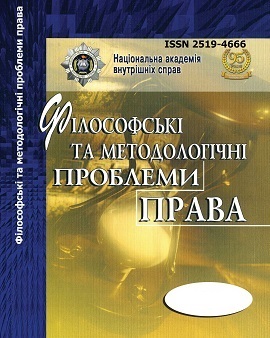The Idea of the General in the Law as an Internal and External Dialogue of the National Legal Orders (Second Half of the XVIII – Begining of the XIX Century)
Abstract
The development of the idea of the General in the law in the European legal thought of the second half of the XVIII – the first third of the nineteenth century is analyzed. The theory of internal and external dialogue of legal systems as a form of General existence in the law is singled out.
The concept of internal dialogue envisaged that in the legal system general elements could be singled out along with nationally peculiar ones. At the same time, the former could actually not be that way, but be so considered, although some scholars have pointed out that the allocation of immanent general elements is objective and involves comparison with other legal order. The internal dialogue involved the isolation, identification and realization of certain elements as general. The most important principles of this approach were: 1) the assertion that the existence of general elements in the law was impossible outside of the national legal orders, but instead their immanence in national law; 2) these elements can be general only in their content, but their form is always nationally peculiar. Consequently, dialogue became the internal interaction of isolated and realized peculiar and general elements, and scientists or lawmakers, depending on their position, could make choice in favor of the priority development of the first, second or both – with the understanding of the inevitability of internal pluralism of any national legal order.
The concept of an external dialogue of legal orders envisaged a generalization of the processes of the emergence of similarities in law as a result of reception, correlation and rivalry of legal orders. Scientists pointed out that most of modern legal orders historically have lost their «purity» (complete pecularity) and consequently their peculiar elements are no longer self-sufficient. When interacting with each other, they act as integrity (unity of general and peculiar elements). The result of their interaction is the cosmopolitan law – as the increase in the weight and volume of general (spread in each individual) elements, which, however, do not lose their immanent (within national legal orders) character. The idea of immanence and interaction of the general and peculiar (or philosophical and historical) as elements within the individuals – national-state legal orders is becoming absolutely dominant and generally accepted. At the same time, it is unambiguously postulated that it is impossible to objectivate of a positive general law that does not have the appropriate social and political basis.
It has been shown that the recognition of the scientists of the inevitability of national plurality and non-total, non-transcendent, immaterial, procedural and immanent character of the social General in the law faced their own national law to the dialogue with others. This dialogue could have a mostly positive (experience exchange) or negative (alien is a negative identifier of our own) character. But the accents and emphases did not change the recognition that this is not just two dialogues, but only two sides of a single dialogue, the result of which is the perception of the individual elements or principles of law by the parties (lawmakers and scholars) – the General is conventional.Downloads
Abstract views: 100 PDF Downloads: 48
Copyright (c) 2018 Philosophical and Methodological Problems of Law

This work is licensed under a Creative Commons Attribution-NonCommercial-NoDerivatives 4.0 International License.
- Authors reserve the right to authorship of their own work and transfer to the magazine the right of the first publication of this work under the terms of the Creative Commons Attribution License, which allows other persons to freely distribute published work with mandatory reference to authors of the original work and the first publication of an article in this magazine.
- Authors have the right to enter into separate additional agreements on non-exclusive dissemination of the work in the form in which it was published in the journal (for example, to post an article in the institution's repository or to publish as part of a monograph), provided that the link to the first publication of the work in this journal is maintained.
- The journal's policy allows and encourages the posting of articles by authors on the Internet (for example, in electronic storehouses of institutions or on personal websites), both before the submission of this manuscript to the editorial office and during its editorial processing, as this contributes to the creation of a productive scientific discussion and positively affects the efficiency and dynamics of citing the published work.




